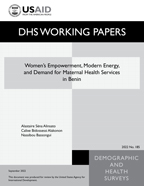There is no printed copy available to order.
Abstract:
Globally, 152 mothers per 100,000 live births
die each year from lack of access to
universal health care services. Most of these
deaths occur in sub-Saharan African
countries, especially in the Middle, Eastern
and Western African countries, where the
prevalence is greater than 500 deaths per
100,000 live births. Despite significant
progress during the last decade, this issue
remains a considerable challenge for sub-
Saharan African countries. This study
analyzed how women’s empowerment may improve
the demand for maternal health services in
Benin.
The study used secondary data from the 2017
Benin Demographic Health Survey. The
methodology included two steps. First, we
focused on the measurement of the variables
of main interest. A composite index of
women’s empowerment was constructed with the
principal component analysis method. This
composite index was based on the social
independence and decision-making pillars.
Demand for maternal health services was
measured through the completeness of
antenatal care visits. Second, univariate
(percentages), bivariate (chi-squared test of
independence), and multiple regression
(trivariate recursive probit model) analyses
were used to determine the levels of access
to modern energy, women’s empowerment, and
the demand for maternal health services, and
the association between the demand for
maternal health services and women’s
empowerment.
Our results revealed that women’s empowerment
in the sample was low, as indicated by a rate
of 53.4% and 46.4% of unempowered women,
respectively, for the social independence and
the decision-making pillars. We reported a
low level of demand for maternal health
services in the sample, as found by the 47.5%
of women who did not complete antenatal care
visits during their last pregnancy. We also
found that the demand for maternal health
services was significantly and positively
associated with women’s empowerment. Being an
empowered woman increases the chance of
completing antenatal care visits by 7.0% and
8.0%, respectively, for the social
independence and decision-making dimensions,
compared with unempowered woman ceteris
paribus, where all other variables are kept
equal. We further highlighted the importance
of women’s wealth in accessing maternal
health services.
To address maternal mortality in sub-Saharan
African countries, policymakers should
improve women’s social independence by
promoting women’s education and access to
information through the diffusion of
information communication and technologies.
Such policies should also focus on improving
economic living conditions in households.
 Women’s Empowerment, Modern Energy, and Demand for Maternal Health Services in Benin (PDF, 786K)
Women’s Empowerment, Modern Energy, and Demand for Maternal Health Services in Benin (PDF, 786K)
